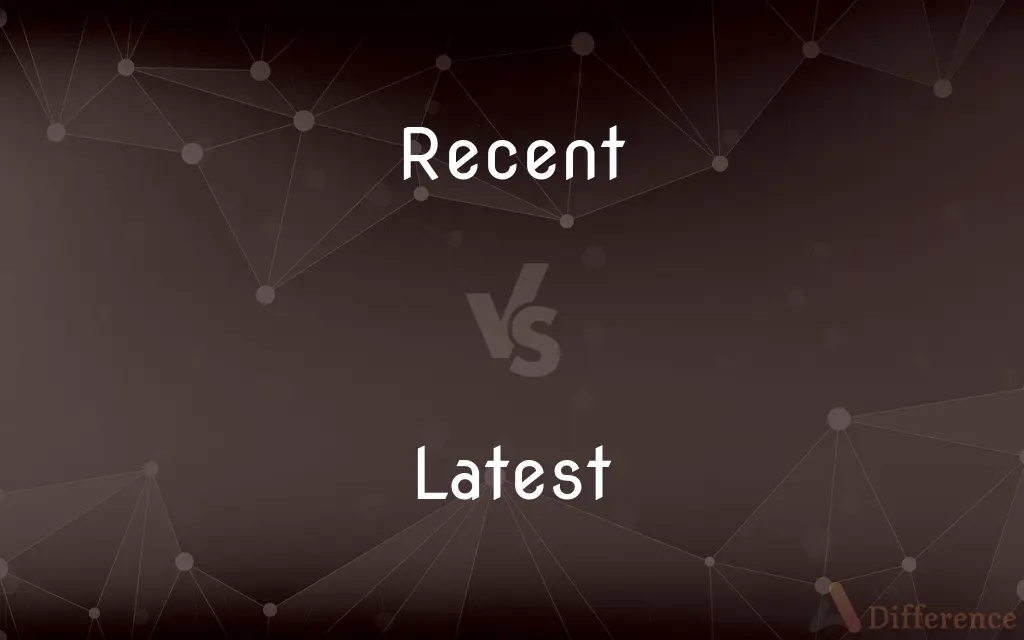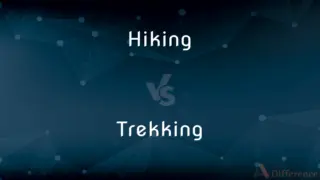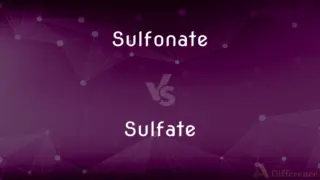Recent vs. Latest — What's the Difference?
Edited by Tayyaba Rehman — By Fiza Rafique — Updated on March 28, 2024
"Recent" refers to something that happened a short time ago, focusing on the near past, while "latest" implies the most current or newest instance of something, emphasizing its position at the end of a sequence.

Difference Between Recent and Latest
Table of Contents
ADVERTISEMENT
Key Differences
"Recent" is used to describe events, developments, or items that have occurred or were produced not long ago, indicating a general timeframe in the near past. This term is often used when the exact timing isn't the focus but rather the recency of the occurrence. On the other hand, "latest" refers specifically to the most current or newest item or event in a series, emphasizing its freshness and immediacy in time, often suggesting that nothing else has superseded it since.
When discussing news or technological advancements, "recent" can describe anything new within a broadly defined period, such as the last few months or even years, depending on the context. "Latest," however, pinpoints the most current development, update, or model available at the moment, with a strong implication that it represents the newest iteration or finding up to the present.
In historical or archival contexts, "recent" might refer to events or discoveries that have happened in the last few decades, underscoring a relative closeness to the present without being immediately preceding. "Latest," in contrast, would identify the most recent addition or discovery made, signifying its position as the newest known or recorded instance.
The choice between "recent" and "latest" can also convey nuances in urgency or relevance. "Latest" carries a sense of immediacy and often greater significance, as it highlights the newest information or items that might supersede previous versions or understandings. "Recent" suggests relevance due to proximity in time but with less emphasis on being the newest or last occurrence.
While "recent" and "latest" are both relative terms, their use can significantly affect the perception of time and importance in communication. "Recent" is more flexible and can refer to a span of time or a series of events, whereas "latest" is more precise, indicating the final or most recent point in a sequence without ambiguity about its temporal position.
ADVERTISEMENT
Comparison Chart
Definition
Refers to something that happened not long ago.
The most current or newest instance of something.
Timeframe
General near past, without strict boundaries.
Specifically the newest or final in a sequence.
Context
Broadly used across various contexts.
Emphasizes newness and current relevance.
Nuance
Indicates proximity to the present.
Suggests immediacy and possibly greater relevance.
Usage
Flexible, can refer to a span of time or series.
Precise, indicates the end or newest point in a sequence.
Compare with Definitions
Recent
Can refer to a period or series of events.
The recent economic trends reflect a gradual recovery.
Latest
The most current or newest instance.
The company announced its latest product release yesterday.
Recent
Relative and dependent on context.
Her recent achievements were discussed at the meeting.
Latest
Often carries a sense of urgency or importance.
The scientist published her latest research findings in the journal.
Recent
Focuses on the near past without strict temporal limits.
Recent technological advancements have revolutionized communication.
Latest
Used when emphasizing newness and current relevance.
The latest iPhone model features groundbreaking technology.
Recent
Broadly applicable to events, findings, or publications.
Recent studies indicate a significant shift in climate patterns.
Latest
Highlights the newest or final point in a series.
The latest news update came in just minutes ago.
Recent
Pertaining to a time not long past.
The museum's recent exhibition showcased modern art from the past decade.
Latest
Specifies the end or newest point without ambiguity.
This is the latest in a series of measures taken by the government.
Recent
Having happened, begun, or been done not long ago; belonging to a past period comparatively close to the present
A recent edition of the newspaper
His recent visit to Britain
Latest
Superlative of late.
Recent
Another term for Holocene
Latest
Something that is the most recent or current of its kind
The latest in electronic gadgetry.
Recent
The Holocene epoch.
Latest
Last, final.
Recent
Of, belonging to, or occurring at a time immediately before the present.
Latest
Most recent.
Here is the latest news on the accident.
My latest album, which is being published next week, is better than her last one.
Recent
Modern; new.
Latest
At the latest.
Complete the XYZ task latest by today 5:00PM.
Recent
Recent(Geology) Of, relating to, or being the Holocene Epoch. See Table at geologic time.
Latest
The most recent thing, particularly information or news.
Have you heard the latest?
What's the latest on the demonstrations in New York?
Have you met Jane's latest? I hear he's a hunk.
Recent
Having happened a short while ago.
Latest
Up to the immediate present; most recent or most up-to-date;
The news is up-to-the-minute
The very latest scientific discoveries
Recent
Up-to-date; not old-fashioned or dated.
Latest
In accord with the most fashionable ideas or style;
Wears only the latest style
The last thing in swimwear
Knows the newest dances
Cutting-edge technology
A with-it boutique
Recent
Having done something a short while ago that distinguishes them as what they are called.
The cause has several hundred recent donors.
I met three recent graduates at the conference.
Recent
(sciences) Particularly in geology, palaeontology, and astronomy: having occurred a relatively short time ago, but still potentially thousands or even millions of years ago.
Recent
Of the Holocene, particularly pre-21st century.
Recent
An earlier term for the Holocene.
Recent
Of late origin, existence, or occurrence; lately come; not of remote date, antiquated style, or the like; not already known, familiar, worn out, trite, etc.; fresh; novel; new; modern; as, recent news.
The ancients were of opinion, that a considerable portion of that country [Egypt] was recent, and formed out of the mud discharged into the neighboring sea by the Nile.
Recent
Of or pertaining to the present or existing epoch; as, recent shells.
Recent
Being new in a time not long past;
Recent graduates
A recent addition to the house
Recent buds on the apple trees
Recent
Of the immediate past or just previous to the present time;
A late development
Their late quarrel
His recent trip to Africa
In recent months
A recent issue of the journal
Recent
Near to or not long before the present;
Recent times
Of recent origin
Common Curiosities
Is "latest" always related to time?
Yes, "latest" is inherently temporal, relating to the most recent point in time for an event or item.
Can "recent" and "latest" be used interchangeably?
While sometimes used interchangeably, their nuances differ; "latest" specifies the newest instance, whereas "recent" is more general.
Can something be "recent" but not "the latest"?
Yes, something can be recent if it occurred in the near past but may not be the latest if something newer has since occurred.
What does "recent" mean?
"Recent" refers to something occurring a short time ago, focusing on the near past without precise boundaries.
Why might someone choose "recent" over "latest" in describing events?
To emphasize the time frame rather than the sequence of events, suggesting a broader look at recent happenings.
How does context affect the use of "recent" vs. "latest"?
The choice depends on whether the emphasis is on general recency ("recent") or the newest, most current instance ("latest").
Is "the latest" always better?
Not necessarily; "latest" denotes newness, not always quality or improvement, though it often implies an upgrade.
How can "recent" be subjective?
"Recent" is subjective because its perception varies with context, such as recent history versus recent events in one's life.
How do news outlets use "recent" and "latest"?
News outlets use "recent" for broader timelines and "latest" for the most current updates or developments.
How is "latest" different from "recent"?
"Latest" implies the most current or newest instance of something, emphasizing its position at the end of a sequence or its status as the newest.
Does "latest" imply improvement or progress?
Often, especially in technology or updates, "latest" implies an improvement or advancement over previous versions.
What impact does using "latest" have on the perceived importance of information?
Using "latest" can increase the perceived urgency or relevance of the information, indicating it is the most up-to-date.
How does "latest" relate to technology and media?
In technology and media, "latest" highlights the most current releases, updates, or news, underscoring their immediate relevance.
Can "latest" refer to something other than time?
Primarily, "latest" is used in temporal contexts, but it can also suggest the latest in trends or ideas, indirectly related to time.
How do historical contexts use "recent"?
In history, "recent" might refer to events that are close to the present day, within the last few decades or years.
Share Your Discovery

Previous Comparison
Hiking vs. Trekking
Next Comparison
Sulfonate vs. SulfateAuthor Spotlight
Written by
Fiza RafiqueFiza Rafique is a skilled content writer at AskDifference.com, where she meticulously refines and enhances written pieces. Drawing from her vast editorial expertise, Fiza ensures clarity, accuracy, and precision in every article. Passionate about language, she continually seeks to elevate the quality of content for readers worldwide.
Edited by
Tayyaba RehmanTayyaba Rehman is a distinguished writer, currently serving as a primary contributor to askdifference.com. As a researcher in semantics and etymology, Tayyaba's passion for the complexity of languages and their distinctions has found a perfect home on the platform. Tayyaba delves into the intricacies of language, distinguishing between commonly confused words and phrases, thereby providing clarity for readers worldwide.














































